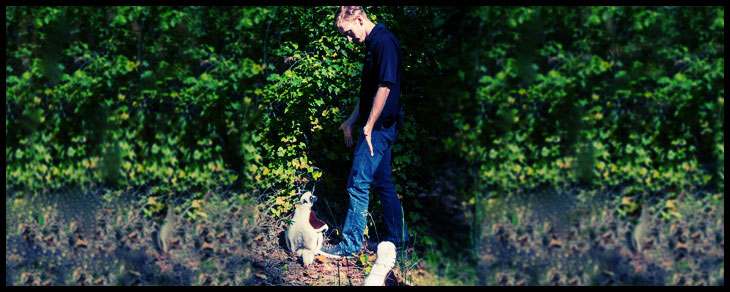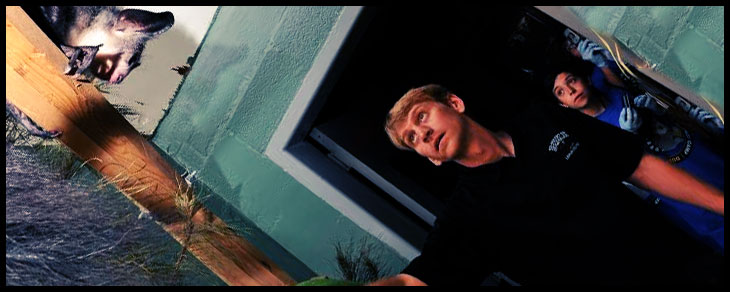Could you summarize what you do now?
I bring out the inner lemur in everyone. My role at the Duke Lemur Center is to raise awareness about the importance of science and conservation through lemurs. I talk to everyone who will listen about lemurs, research that goes on at the Lemur Center and their conservation in the wild in Madagascar. I give guided tours, I write for Facebook and Twitter, I snap pictures for SnapChat, and make videos about lemurs, all to get the message out about how threatened lemurs are and how important they are for science. I manage the daily operations of our education programs, from guided tours, to Skype sessions to classroom activities.

What does a typical field day look like?
A typical day for me involves a lot of talking and writing and looking at lots of lemurs. I give tours of the facilities and get people up-close to some of our lemurs. I teach people about a lemur’s ability to jump 30 feet, or detect relatives based on scent, or talk about deforestation and climate change in Madagascar. I connect with people in-person and online to show them the amazing world of lemurs and the Duke Lemur Center. I post interesting lemur-y things to Facebook, Twitter, Instagram and SnapChat. But I’m also the manager, so I have to make sure there’s enough tour guides and t-shirts in the gift shop, too. I may even find myself at a Duke basketball dressed as a giant lemur dancing at half-court.

What inspired you to start doing this?
I was always fascinated by animals as a child – trips to the zoo were my favorite! I was inspired to help save endangered species through educating the public when Steve Irwin (that’s right – the Crocodile Hunter) passed away. I decided to start studying environmental science halfway through college and started working with animals – and discovered the Duke Lemur Center when I got to Duke for my masters degree– because I wanted to inspire others to protect wildlife, just as I had been inspired.
Why do you think it’s important – how does it benefit the animals?
Madagascar is a global treasure. Nearly 90% of plant and animal life in Madagascar only exists there, and once those unique species disappear they are gone forever. Additionally, the study of primates like lemurs can teach us a whole lot about ourselves as primate relatives. We need to understand these animals through science if we want to care for them at the Lemur Center and protect them in the wild.
What is the hardest thing about doing this?
The hardest thing about working to save lemurs and encourage scientific study is learning just how threatened lemurs are in Madagascar. Every day that I communicate our message of lemurs, science and conservation is spent knowing that the rate of habitat loss, hunting and poaching of lemurs is increasing in some parts of Madagascar. That lemurs are holding on tight to Madagascar to survive, but a lot of work needs to be done – working alongside local communities – to improve the future for lemurs.

What is the most rewarding thing about it?
I spend my working days surrounded by the largest and most diverse colony of lemurs outside of Madagascar. As I write this, I can hear black & white ruffed lemurs calling out from our forested enclosures. Lemurs are absolutely the most adorable animals on the planet, but they’re also very smart and charismatic. It’s impossible to have a bad day when you’re watching a lemur. I’ve seen the Lemur Center grow its reach from a hidden secret at Duke, to one of the top things to do in Durham. We’re reaching more people than ever before to promote lemur science and lemur conservation, which promotes science and conservation across the board.
What if others want to help but don’t want to go into the field. How can they help?
Anyone can help us save lemurs! They can visit the lemurs at Duke. They can tell their friends and families about lemurs and the Lemur Center. Choose lemurs for a science project at school. Launch a fundraiser for lemur conservation. Volunteer at the Lemur Center, or local zoo. Even small changes like recycling more and reducing their carbon footprint helps save the planet from pollution and climate change, which does affect lemurs. Of course, anyone can donate money to the work of the Lemur Center, and all of our education and conservation programs in Durham and in Madagascar are funded by donations and grants – so we need everyone’s help.
Finally, do you have any advice for a young student wanting to study something like this? What would you tell them?
First, go outside and explore the natural world in your backyard, a park, even in the city. Watch the changing seasons, ants build a mound, birds migrate, phases of the moon. Then, ask questions about those things and look for the answers until no one knows; be curious.
Second, if you want a job working as an educator at a lemur center or a zoo, or working with animals, find places that let you learn and gain experience. Be a nature camp counselor, volunteer at the zoo, find community groups working to protect animal habitat and help out. I started working as an educator in my local state parks, taking people on guided nature hikes and talking about our local wildlife.

Lastly, if you’re in college and looking for a career path, then focus on the sciences, like biology, zoology, wildlife science and conservation biology. But more importantly, get out there in the field. Talk to your professors, look for internships, or find a summer job that lets you work with animals or talking to the public. You’ll need a college degree, likely, but the experience will help you go a lot farther. (My background is that I have a history degree, but worked as an environmental educator during my summers in college. My work experience got me accepted into an environmental management masters program at Duke, which led me to the Lemur Center.)
Learn more / Contact Chris Smith
If you want to learn more about the lemurs, Chris is a good first contact. You can reach him here:

Also, he can be found via these links:
































































































